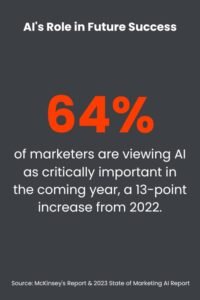LAST UPDATED: MARCH 26, 2025
The search for an AI marketer has become the top priority for forward-thinking companies in 2025. McKinsey’s latest research reveals why: 72% of organizations now use AI in their operations, yet 75% of employers report significant difficulties finding marketers who can effectively leverage this technology. If you’re looking to hire an AI marketer, you’re not just filling a position—you’re investing in your company’s competitive edge.
When hiring an AI marketer, the landscape is clear: organizations that successfully bring these specialists on board are seeing ROI increases of up to 50% on their campaigns. It’s no wonder that 71% of business leaders now prioritize AI capabilities over traditional experience in their hiring decisions. But here’s what makes hiring an AI marketer particularly challenging—there’s a massive gap between those who claim AI proficiency and those who can actually drive results.
This comprehensive guide will walk you through exactly how to hire an AI marketer who can transform your marketing operations. We’ll break down the essential skills, red flags to watch for, and proven interview strategies to help you identify genuine AI marketing talent. Whether you’re building a new team or upgrading your existing marketing capabilities, you’ll learn how to find and hire an AI marketer who can turn artificial intelligence into authentic business growth.
Understanding the AI-Driven Marketing Environment
The adoption of AI in marketing
The integration of Artificial Intelligence (AI) in marketing is revolutionizing the field, bringing significant shifts in the skills and experiences sought by hiring managers for top marketers. Current trends in AI in marketing include Generative AI, Autonomous AI, Causal AI, Conversational AI, and Predictive Analytics, each offering unique capabilities to enhance marketing strategies and the tactics used to execute against them. Generative AI, in particular, commands significant attention from the marketing community and continues to grow in popularity, despite challenges related to legal and ethical concerns.
The application of AI in marketing is not new, as evident from its widespread use across various stages of the customer lifecycle since at least 2017. However, the pace of adoption and the depth of integration into marketing workflows have increased significantly.

McKinsey’s “State of AI in 2022—and a half decade in review” report highlights that the adoption of AI in various industries, including marketing, has more than doubled since 2017. This surge in AI adoption, from 20% in 2017 to 50% in 2022, reflects a significant transformation in the marketing landscape from a technology occasionally used, to one that is now depended upon to drive results. In fact, according to the 2023 State of Marketing AI Report, 64% of marketers view AI as critically important for success in the next 12 months, a 13-point increase from 2022.
The investment of AI in marketing
Moreover, the scale of investment in AI has grown alongside its adoption. More than half of the organizations using AI now allocate over 5% of their digital budgets to AI, with expectations of increased investment in the coming years. Interestingly, the impact of AI has been particularly pronounced in marketing and sales, where the most significant revenue effects are observed. Look at AI in CRM-related activities, where the technology is projected to boost business revenue by $1.1 trillion by 2023, while AI-driven email marketing revenue is expected to have increased from $290.92 million in 2017 to $479.02 million in 2021.

The challenge: adoption ≠ understanding
However, business leaders are presented with a dichotomy: while 64% of marketers recognize AI as critically important for success in the upcoming year, a substantial 78% report a lack of AI-focused education or training in their organizations.
Given that more than 30% of marketers classify their understanding of AI as “beginner” and 54% classify their understanding as “intermediate”, there is a crucial challenge for business leaders to solve: fostering an environment that not only embraces AI, but also equips marketing teams with the necessary people, skills, and knowledge to leverage it effectively. But this training can’t just be for frontline marketers. CMOs, often at the forefront of AI adoption in marketing, reportedly lag in AI understanding and usage compared to other C-suite roles, indicating a need for targeted leadership development in this area.
“42% of marketers have not received any formal training on AI and its applications in marketing.” – SOCi
Given that most marketers haven’t been able to rely on formal AI training from their organizations, what skill sets should you be focusing on when evaluating talent?
The Skills Every AI-Savvy Marketer Should Have
In the era of AI-driven marketing, the skill sets required for marketers are evolving rapidly. That means you should be looking for a blend of technical proficiency, soft skills, and a commitment to continuous learning in potential candidates. Here are 10, plus a bonus, we recommend you screen for:
1. Intellectual Curiosity: The ability to dig deeper than the surface to understand and creatively apply information generated by AI tools is needed. For instance, a social media manager using AI to draft a strategy should be able to analyze and customize the AI-generated plan to align with the company’s goals, products, target audience, and channel specific nuances and content consumption patterns.
2. Adaptability: In the fast-evolving landscape of AI and digital marketing, tools and strategies are continuously changing, requiring marketers to quickly adapt and stay ahead of the curve. This adaptability not only pertains to mastering new AI technologies as they emerge, but also to the ability to pivot strategies based on AI-driven insights.
3. Objectivity: AI tools, created by humans, can inherit human biases. Marketers should possess the objectivity to recognize and account for potential biases in AI outputs. This involves understanding the subjective nature of AI’s data interpretation and decision-making processes.
4. Analytics and Data Skills: Proficiency in analytics and data interpretation is vital. Marketers should be able to translate AI-generated data into actionable insights, understand consumer behavior and motivations, and make data-driven decisions.
5. Emotional Intelligence: As AI integrates into customer-centric marketing, emotional intelligence becomes more valuable. Marketers need the ability to genuinely connect with consumers, understand context along the customer journey, and tailor content for a highly personalized experience, something AI alone cannot achieve.
6. Creativity: The unique, creative mindset of a human marketer is irreplaceable. AI allows marketers to focus more on creative tasks and strategy development, which are essential for connecting with consumers on an emotional level and fostering brand loyalty and repeat business.
7. Creative Problem-Solving: The ability to leverage AI tools in novel ways to overcome challenges and seize opportunities. It involves not just using AI for data analysis and automation, but for marketing strategy development, campaign execution, team engagement, and more.
8. Lifelong Learning: In an ever-evolving field like AI-driven marketing, continuous learning and skill expansion are non-negotiable. Marketers must stay abreast of new technologies and techniques to maintain their relevance and effectiveness in the field.
9. Strategic Vision and Application: Marketers must have the foresight to effectively integrate AI into broader marketing strategies and campaigns. This encompasses knowledge of when and how to use AI for personalization, automation, and predictive analytics.
10. Technical Proficiency: Marketers need to be comfortable using AI-powered tools for various functions such as customer relationship management, content creation, and data analytics. This includes understanding how these tools work and how to apply them effectively in their specific marketing role.
Maximizing the potential of AI technology necessitates possessing a varied skill set, including data analysis, strategic planning, creative problem-solving, and technology-literate adaptability. But these skills aren’t an exhaustive list. They simply form the bedrock upon which a successful AI-powered marketer can build upon.
Having established the importance of these skills, let’s turn our attention to another equally crucial aspect – experience. The breadth and depth of a marketer’s experience can speak volumes about their capabilities, particularly in the application of AI technology within marketing strategy, campaign execution, and data analysis. Let’s delve into the types of experience that should be evaluated when recruiting an AI-savvy marketer.
Experience Matters – What to Look For
Today’s best marketers not only possess a toolbox of AI capabilities but also demonstrate the ability to deploy these tools across a variety of strategic and practical applications. This unique blend of practical know-how and strategic finesse is what sets AI-savvy marketers apart. Let’s explore the diverse experiences these innovative marketers bring to the table – and a few of tools they will likely have experience using.
• Data Analysis and Customer Insights: Proficiency in tools like Google Analytics, Tableau, and Kissmetrics. These tools are instrumental in dissecting user data and unearthing customer behavior insights.
• Customer Relationship Management (CRM): Experience with Salesforce Einstein or HubSpot’s AI functionalities. These platforms are key to predictive lead scoring, customer engagement, and end-to-end funnel analysis.
• Content Creation and Optimization: Familiarity with AI tools such as MarketMuse, Clearscope, and Grammarly. These are vital for informed content planning, optimization, and AI-enhanced writing quality.
• Email Marketing: Experience with tools like Persado, Phrasee, and Seventh Sense, which are crucial for fine-tuning email marketing strategies.
• Chatbots and Conversational AI: Experience with platforms like Drift, Intercom, and ManyChat for deploying AI-powered conversational agents in customer engagement.
• Advertising and Media Buying: Proficiency with Albert and Adext. These tools are vital for optimizing ad buying and placement decisions.
• Social Media Management: Familiarity with Sprinklr and Cortex for AI-assisted content scheduling and social media analytics.
• Predictive Analytics: Experience with tools like RapidMiner and Alteryx for forward-looking marketing analytics and decision-making.
In your search for the ideal AI-savvy marketer, prioritize candidates who can showcase how they’ve leveraged these tools to drive real-world results. Their proficiency should extend beyond mere tool usage to include a strategic, creative approach to integrating AI into broader marketing objectives that include pipeline generation, improved pipeline velocity, marketing-sourced revenue, and increased program efficiency.
AI-transformed Marketing Era
As we pull back the curtain on this AI-transformed marketing era, it’s clear that the quest for top-tier talent has evolved. Hiring managers, take note: the gold standard candidate now brandishes a dual-edged sword of AI expertise and foundational marketing prowess. The clincher? Hands-on experience with AI-powered marketing tools, turning data into strategies, and prospects into profits. So, as you begin your search to find your next marketing maestro, let proficiency in AI be an important beacon.





